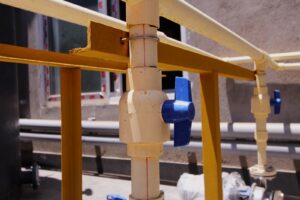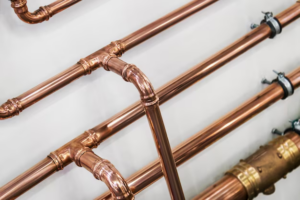Choosing the Right Water Piping: Unraveling the Pros and Cons of PEX, PVC, and Copper
When it comes to water piping for your home, the choices can be overwhelming. PEX, PVC, and Copper are three popular options, each with its unique set of advantages and drawbacks. Understanding the differences is crucial to making an informed decision that suits your specific needs.
In this guide, we’ll break down the pros and cons of these flexible water piping materials, helping you navigate through the maze of options. Remember, while DIY projects are commendable, seeking professional advice from Local Service Pro Plumbing ensures a tailored recommendation for your home’s plumbing system.
The Crucial Role in Your Home’s Plumbing System
Choosing the right water piping for your home is a decision that significantly impacts the overall efficiency and longevity of your plumbing system. Each type of piping material, whether it’s PEX, PVC, or copper, comes with its own set of advantages and disadvantages. The wrong choice may lead to frequent leaks, reduced water quality, and increased maintenance costs.
PEX, known for its flexibility and ease of installation, is a popular choice, especially for retrofitting projects. PVC, a durable and cost-effective option, is commonly used for drainage and non-potable water systems. Copper, a traditional and reliable material, is preferred for its durability and resistance to corrosion. However, the selection depends on various factors such as the specific needs of your plumbing system, budget considerations, and the local climate.
The importance of choosing the right water piping extends beyond the initial installation. Proper piping ensures a reliable water supply, prevents leaks, and maintains water quality. Additionally, the right piping material can withstand the unique challenges posed by different environments, ensuring the longevity and efficiency of your plumbing system. To make an informed decision tailored to your specific requirements, it’s recommended to consult with plumbing professionals who can provide expert guidance based on their experience and knowledge of local conditions.
Pros & Cons On PEX, PVC, and Copper Piping
When it comes to choosing the right water piping for your plumbing needs, considering the pros and cons of various materials is crucial. To make an informed decision that aligns with your specific requirements, it’s advisable to delve into the details of each option. Let’s take a look at the following pros and cons on each piping material and see for yourself which one is the best one for your home.
PEX (Cross-linked Polyethylene)
- Pros
Flexibility: PEX is highly flexible, allowing for easier installation in tight spaces and minimizing the need for additional fittings.
Corrosion Resistance: Unlike metal pipes, PEX doesn’t corrode or develop scale, ensuring long-term durability.
Cost-Effective: PEX is generally more affordable than copper, making it a budget-friendly option for plumbing projects.
Resistance to Freezing: PEX has the ability to expand and contract, reducing the risk of bursting in freezing conditions.
- Cons
Not Suitable for Outdoor Use: PEX is vulnerable to UV rays, limiting its suitability for outdoor applications.
Not Recyclable: While environmentally friendly during production, PEX is not recyclable, potentially raising concerns for some.
PVC (Polyvinyl Chloride)
- Pros
Affordability: PVC is one of the most cost-effective piping materials, making it suitable for various plumbing applications.
Chemical Resistance: PVC is resistant to corrosion and chemical damage, ensuring the longevity of the piping system.
Lightweight: PVC pipes are lightweight, simplifying handling and installation.
- Cons
Not Suitable for Hot Water: PVC is not recommended for hot water applications, as it can warp or degrade at higher temperatures.
Limited Flexibility: PVC pipes are rigid and less flexible, which may require additional fittings in complex plumbing layouts.
Copper
- Pros
Longevity: Copper pipes have a long lifespan and can last for decades without deterioration.
High Heat Tolerance: Copper is suitable for both hot and cold water applications, maintaining structural integrity at high temperatures.
Resistant to Bacterial Growth: Copper has inherent antimicrobial properties, contributing to water quality.
- Cons
Cost: Copper piping tends to be more expensive than PEX and PVC, impacting overall project costs.
Prone to Corrosion: While corrosion-resistant, copper can corrode over an extended period, particularly in aggressive water conditions.
Understanding the pros and cons of each type of piping material allows homeowners and contractors to make informed decisions based on their specific needs, budget constraints, and environmental considerations. For personalized advice tailored to your circumstances, consulting with plumbing professionals is highly recommended.
Expert Guidance from Local Service Pro Plumbing
When navigating the intricate landscape of water piping choices, it’s essential to weigh the benefits and drawbacks of PEX, PVC, and copper. While understanding the key characteristics of each material is a valuable first step, making the optimal decision for your plumbing system requires a deeper analysis. The expertise of plumbing professionals can guide you through this decision-making process, ensuring that your choice aligns seamlessly with your specific needs.
Local Service Pro Plumbing is ready to provide personalized insights and assistance, ensuring that your water piping selection is not only informed but tailored to optimize your plumbing system’s performance. Contact us today for reliable advice and expert service.




